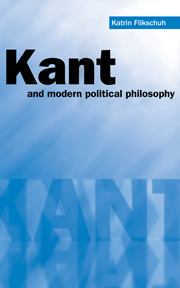Book contents
- Frontmatter
- Contents
- Acknowledgements
- List of Kant's works and abbreviations
- Introduction
- 1 Kantian metaphysics in contemporary liberalism
- 2 The metaphysics of freedom as an idea of reason
- 3 The morality of external freedom
- 4 The Lex Permissiva: property rights and political obligation in the Rechtslehre
- 5 The general united will and cosmopolitan Right
- 6 The metaphysics of Kant's cosmopolitanism
- Select bibliography
- Index
5 - The general united will and cosmopolitan Right
Published online by Cambridge University Press: 22 September 2009
- Frontmatter
- Contents
- Acknowledgements
- List of Kant's works and abbreviations
- Introduction
- 1 Kantian metaphysics in contemporary liberalism
- 2 The metaphysics of freedom as an idea of reason
- 3 The morality of external freedom
- 4 The Lex Permissiva: property rights and political obligation in the Rechtslehre
- 5 The general united will and cosmopolitan Right
- 6 The metaphysics of Kant's cosmopolitanism
- Select bibliography
- Index
Summary
All men are originally (i.e., prior to any choice that establishes a right) in a possession of land that is in conformity with Right, that is, they have a right to be wherever nature or chance (apart from their will) has placed them … The possession by all men on the earth that precedes any acts of theirs which would establish rights is an original possession in common, the concept of which is not empirical and dependent on temporal conditions.
(RL, 6:262)INTRODUCTION
The previous chapter interpreted the lex permissiva as a ‘dark preliminary judgement’ of pure practical reason. The postulate's provisional authorisation of unilateral acquisition leads to agents' reflective acknowledgement of the fact that any exercise of their freedom of choice and action entails obligations of justice towards others. On the one hand, given my innate right to freedom as a positive capacity, it must be possible for me to claim external objects of my choice as mine. On the other hand, given the constraints of nature, any such act of choice compromises the equally valid claims to freedom of everyone else. Subjects' obligations of justice towards one another are a direct corollary of their exercise of freedom of choice and action. One might characterise this judgement as requiring a recognitional shift from a conception of intelligible possession as a subject/object relation, to one which acknowledges that rightful possession defines a relation between subjects with regard to external objects of their choice.
- Type
- Chapter
- Information
- Kant and Modern Political Philosophy , pp. 144 - 178Publisher: Cambridge University PressPrint publication year: 2000



